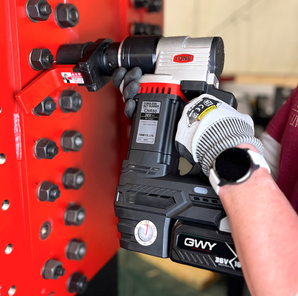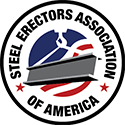 Torque wrenches deliver the power and accuracy required to tighten nuts and bolts while preventing structural damage. These tools ensure that connections are tightened according to engineering specifications and prevent loosening while a structure or piece of equipment is in use. Torque wrenches also prevent over-tightening, which can damage threads, shorten the lifespan of a connection or cause sudden structural failure. When choosing industrial torque wrenches and multipliers, you’ll need to consider project specifications, maneuverability and available or preferred power source. It’s important to remember that your initial purchase or rental is not only about procuring the product — it’s about the subsequent service. Every torque tool requires yearly calibration, so make sure the supplier you’re considering can provide annual calibration services, certificates and necessary repairs. Read on for what to consider when selecting a torque wrench for your application and some important safety reminders. Types of Industrial Torque Wrenches High-capacity torque wrenches can either be hydraulic, manual, electric, battery-powered, or pneumatic. Torque wrenches can be categorized further depending on their design and intended application. Manual (Click-Type) Torque Wrench These hand-operated tools can be set to deliver a specific amount of torque and will “click” once the desired torque has been reached. Click-type torque wrenches are best for jobs in tight spaces or with low visibility, since the wrench will give an audible cue once it achieves the preset torque. These tools have long lifespans, few parts or accessories and are fairly simple to use. Torque Multiplier For bolts that require a high amount of torque (or have been over-tightened), torque multipliers can deliver additional torque without requiring extra force on the part of the operator. Torque multipliers are essential for maintaining worker safety while tightening or loosening bolts by hand. Multipliers can also increase torque at small intervals at a very slow pace, reducing the risk of over-torquing or worker injury. Electric Torque Wrench With the ability to deliver more precise accuracy than an analogue tool, corded or battery-powered electric torque wrenches can be preset to a desired torque within ±3% to ±5% repeatable accuracy. If you choose to go untethered with a battery-powered torque wrench, have extra batteries or a charger on hand. If corded electric torque wrenches are your preference, be sure there is adequate clean power that allows you to safely reach your work area. This includes the proper generators (no welding generators or boom lifts) and/or properly installed spider boxes that output the correct power for the tools. If extension cords are necessary, anything longer than 150 ft. is not recommended. Hydraulic Torque Wrench When it comes to larger jobs, hydraulic torque wrenches are able to deliver over 25,000 ft.-lbs. of torque. They come in square-drive or low-profile designs called cassettes, which consist of the cassette and drive unit. Hydraulic wrenches themselves are quite light, but are accompanied by heavy systems that can carry a high price tag. Hydraulic systems include pumps and a stiff hose that can be difficult to move. Hydraulic torque wrenches also carry safety concerns related to pinch hazards and hydraulic fluid leaks, and should only be used by trained operators. Pneumatic Torque Wrench Like hydraulic tools, pneumatic torque wrenches can deliver much higher torque than a manual or electric wrench, but require additional equipment like an air hose and compressor. Torque Wrench Considerations The type and model of torque wrench you choose depends on your specific use case. Some considerations are fairly straightforward — torque range, size, power source — while some are often overlooked during the buying or rental process. Here is a list of questions to consider while making your torque tool selection:
Torque Wrench Safety Tips Be sure that all operators are briefed on safe handling and precautions before using any high-capacity torque tools. Here are some general safety guidelines to keep in mind:
Read the full article from GWY here. This Safety Flash was contributed by Don Laro, Sales and Marketing Manager for GWY, in cooperation with SEAA’s Safety & Education Committee. It’s designed to keep members informed about ongoing safety issues and to provide suggestions for reducing risk. Best practices are gathered from a variety of sources. They may be more or less stringent than individual corporate policies and are not intended to be an official recommendation from SEAA. Always get approval and direction from your company officers on any new practice or procedure as these best practices may not work for all situations. Everyone benefits when a worker avoids injury. Submit your ideas for Safety Flash to [email protected]. Comments are closed.
|


 RSS Feed
RSS Feed
